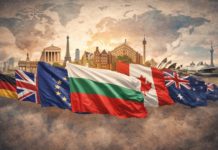By Rumyana Vakarelska
The merciless terrorist attacks in Paris on the night of 13.11 have sent shock waves across Europe and the world, calling for a new common European defence and security strategy and legislation, which make the safety and the interests of EU, as well as of the Western Balkan countries, a top priority. Some of these expectations are now slowly being addressed in a few EU countries, but not as a common approach, also defying if not on paper, but in in reality, Schengen’s existence.
In a joint communique, following the death of 129 people from different nationalities and injuring 320, EU leaders declared November 16 that the war on France is war on Europe, but without defining a convincing civilian security and political approach outside the immediate military airstrikes undertaken by France in Syria. This is especially the case considering the previous warning signals of such possible terrorist attacks in France and elsewhere in Europe and one should not look far to find friends or ex-pats that may have been effected.
One 37-old Bulgarian citizen, Sebastian Poazi, with a dual French citizenship, was among the fatalities in one of the seized Paris cafés, while the ex-pat Nikolay Stefanov, had his French girlfriend injured, but now she is recovering, Nick Alexander, working that night in Bataclan Theatre is the much loved rock fan Brit, who lost his life.
Following the G20 Summit this week and the initial face-to-face meeting on the crisis between the US President Barak Obama, the Russian President Vladimir Putin and the French President Francois Hollande, another meeting later on this week in Paris between the three may be a stepping stone in defining their roles and positions in this emerging military coalition. Meanwhile, UK’s PrIme Minister David Cameron will aim to get the Commons’ support for Britain military intervention in Syria after managing to prevent an attack on its territory only a few weeks ago.
However, the political reassurance that all EU citizens have long expected in the new geopolitical situation that emerged from the disintegration of Syria, is this week starting to happen in the face of the introduction of new legislation and security measures that will address their concerns.
To start with, Mr Hollande pledged in the French Parliament on 14 November the introduction of new legislation that will allow tighter security measures, an extension of the state of emergency in France that he declared last Friday for up to two weeks. The new legislation also included the removal of double citizenships on people who may cause security threats among an increased budget for security, including increasing the armed police presence on the streets of France by 5,000 and also the addition of 1,500 military personnel.
France, together with a number of other EU countries, closed their borders after the attack on Friday, while also reinforcing border checks and undertaking over 150 simultaneous police raids leading to valuable findings in troubled places like Brussel’s Molenbeek neighbourhood, where the possible master mind of the Paris attacks was based.
Last week, the Bulgarian government formed a new security council, allowing the deployment of more border police and army troops at Bulgaria’s green borders. Meanwhile, since Saturday 14 November, it closed its green borders with its non-EU neighbours, including Turkey, Serbia and Macedonia.
According to the Bulgarian Interior Ministry, since the start of 2015, 9,000 illegal immigrants have been stopped at the Bulgarian border. Some 60% of the people in the refugee camps are economic migrants from Afghanistan and Pakistan, and about 10% of all entrants presented false documents, including saying that they have been recruited by the Taliban in Afghanistan to become soldiers, according to the Chief Secretary of the Bulgarian Interior Ministry.
The closure of Bulgaria’s external borders, especially at Captain Andreevo, the key border point with Greece and one of the busiest border points in the world for cargo and people transit, is now causing a 12 km vehicle queue. Earlier this autumn, two Jihadi fighters from Kosovo have been detained at Bulgaria’s green border.
Early last week, the Bulgarian Security Council drafted a plan of how to deal with the immigration crisis, including financial and technical measures. The Council also envisages a new anti- terrorism law, a cyber security strategy, as we all as laws for the protection of the Bulgarian telecommunications and information systems. The Council also suggested that a common and sustainable EU position is needed to deal with the immigration from the Middle East and the political and military crisis in the region, as well as the inclusion of the Western Balkans in the EU’s security zone.
The Polish foreign Minister has meanwhile suggested that the number of young refugees who arrived in the EU could also be organised as an army after training in their host countries and then be sent back to Syria to help with establishing peace and normal life in the country.
©Rumy Vakarelska, Editor-in-chief, Team New Europe, a UK/EU political Action-Tank















